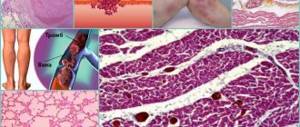| The causes of autoimmune diseases still remain a mystery |
Autoimmune diseases are a large group of diseases that can be combined on the basis that their development involves an immune system that is aggressive against its own body.
The causes of almost all autoimmune diseases are still unknown.
Given the huge variety of autoimmune diseases, as well as their manifestations and course, a variety of specialists study and treat these diseases. Which ones exactly depend on the symptoms of the disease. So, for example, if only the skin suffers (pemphigoid, psoriasis) a dermatologist is needed, if the lungs (fibrosing alveolitis, sarcoidosis) - a pulmonologist, joints (rheumatoid arthritis, ankylosing spondylitis) - a rheumatologist, etc.
However, there are systemic autoimmune diseases when different organs and tissues are affected, for example, systemic vasculitis, scleroderma, systemic lupus erythematosus, or the disease “goes beyond” one organ: for example, with rheumatoid arthritis, not only joints, but also skin can be affected , kidneys, lungs. In such situations, most often the disease is treated by a doctor whose specialization is related to the most striking manifestations of the disease, or by several different specialists.
The prognosis of the disease depends on many reasons and varies greatly depending on the type of disease, its course and the adequacy of the therapy.
Treatment of autoimmune diseases is aimed at suppressing the aggressiveness of the immune system, which no longer distinguishes between “our own and someone else’s.” Medicines aimed at reducing the activity of immune inflammation are called immunosuppressants. The main immunosuppressants are Prednisolone (or its analogues), cytostatics (Cyclophosphamide, Methotrexate, Azathioprine, etc.) and monoclonal antibodies, which act most specifically on individual parts of inflammation.
| Treatment of autoimmune diseases depends on which organs are affected |
Many patients often ask questions: how can one suppress their own immune system? How can I live with “bad” immunity? It is not possible to suppress the immune system in autoimmune diseases, but it is necessary. The doctor always weighs what is more dangerous: the disease or the treatment, and only then makes a decision. So, for example, with autoimmune thyroiditis there is no need to suppress the immune system, but with systemic vasculitis (for example, microscopic polyangitis) it is simply vital.
People live with suppressed immunity for many years. At the same time, the frequency of infectious diseases increases, but this is a kind of “payment” for treating the disease.
Patients are often interested in whether they can take immunomodulators. There are different types of immunomodulators, most of them are contraindicated for people suffering from autoimmune diseases, however, some drugs may be useful in certain situations, for example, intravenous immunoglobulins.
Systemic autoimmune diseases
Autoimmune diseases often present diagnostic difficulties, require special attention from doctors and patients, are very different in their manifestations and prognosis, and, nevertheless, most of them are successfully treated.
This group includes diseases of autoimmune origin that affect two or more organ systems and tissues, for example, muscles and joints, skin, kidneys, lungs, etc. Some forms of the disease become systemic only as the disease progresses, for example, rheumatoid arthritis, while others immediately affect many organs and tissues. As a rule, systemic autoimmune diseases are treated by rheumatologists, but such patients can often be found in the departments of nephrology and pulmonology.
Major systemic autoimmune diseases:
- Systemic lupus erythematosus;
- systemic sclerosis (scleroderma);
- polymyositis and dermapolymyositis;
- antiphospholipid syndrome;
- rheumatoid arthritis (does not always have systemic manifestations);
- Sjögren's syndrome;
- Behçet's disease;
- systemic vasculitis (this is a group of different individual diseases, united on the basis of a symptom such as vascular inflammation).
Classification
There are organ-specific and systemic forms of autoimmune diseases. In the organ-specific form, one organ is affected. If the pathology affects two or more organs, a systemic form of the disease is diagnosed. Most autoimmune diseases can occur in both organ-specific and systemic forms, and quite often the disease begins with damage to one organ and, as it progresses, spreads to others.
Autoimmune diseases are also divided depending on the organs and systems of the body that are predominantly affected by this disease. In particular, autoimmune diseases with predominant damage are distinguished:
- joints (spondyloarthritis, or ankylosing spondylitis, rheumatoid arthritis);
- endocrine system (diabetes mellitus type 1, diffuse toxic goiter);
- nervous system (multiple sclerosis, Guillain-Barré syndrome);
- liver and gastrointestinal tract (autoimmune forms of hepatitis and pancreatitis, ulcerative colitis, celiac disease);
- skin (psoriasis, vitiligo, chronic urticaria);
- kidneys (autoimmune forms of nephritis);
- heart and blood vessels (rheumatism, some forms of myocarditis, vasculitis);
- lungs (fibrosing alveolitis, pulmonary sarcoidosis).
Living factories
In the 80s, the technology for producing antibodies on an industrial scale was mastered. Instead of synthesizing these complex molecules themselves, scientists entrusted this process to natural antibody “factories”—cultures of living antibody-producing cells. Such cells “learn” to produce specific antibodies after contact with the corresponding antigen (target for antibodies) - and then put antibody production on stream; All that remains is to isolate and purify the product. The result is monoclonal (that is, completely identical) antibodies that can be used to treat autoimmune diseases; they are also called genetically engineered biological products (GEBPs).
Treatment with genetically engineered biological drugs that suppress the immune system has a number of advantages over other types of therapy: biological medications do not produce serious side effects characteristic of cytostatics and hormonal drugs, and often work in cases where other drugs are powerless. But the very nature of their effectiveness—potent immune suppression—leaves patients vulnerable to infections. Therefore, therapy with monoclonal antibodies should be carried out under the supervision of doctors.
Autoimmune rheumatic diseases are diagnosed and treated using effective modern methods, including genetically engineered biological drugs. MEDSI employs experienced rheumatologists and immunologists; many of them have extensive experience working with patients who require gene therapy. Despite the fact that most rheumatic diseases cannot be completely cured, MEDSI doctors are able to stop the disease and give patients the opportunity to live an active life.
To suppress is to cure
The first successes in this area were achieved in the middle of the 20th century, when the first immunosuppressive (that is, suppress the immune system) drugs appeared. At first these were hormonal drugs - prednisolone and its derivatives, as well as “cytostatics” - drugs that initially killed cancer cells, but they quickly discovered that cytostatics were much better at suppressing the immune system.
Nowadays, scientists are looking for new immunosuppressants - safer, without side effects, and as selective as possible - ones that will act only on “broken” areas of the immune system, without disturbing the rest of the body’s cells. About 30 years ago, it became clear that it was almost impossible to synthesize substances with such properties using conventional methods - it was too difficult to predict the structure of the molecule of a future drug. Nature itself suggested a solution: instead of synthetic drugs, you can use antibodies - substances that are produced in the body and interact as selectively as possible with different components of the immune system.
Symptoms of autoimmune urticaria
The manifestations of idiopathic urticaria are no different from the chronic course of its allergic variant. Patients complain of urticarial skin rashes and note their tendency to merge. Food, insect, household, chemical, physical or psychogenic factors can provoke a deterioration of the condition or a new relapse of the disease.
Patients with severe urticaria are characterized by resistance to traditional treatment regimens, torpidity and variability of symptoms. During exacerbations, general weakness, decreased tolerance to physical activity, and digestive tract dysfunction may be observed.
Rheumatoid arthritis (RA)
This is a systemic chronic autoimmune disease that mainly affects the joints in the periphery. As a result of autoimmune inflammation, destructive changes occur and the disease disables the person. And again, mostly women are targeted. The fact is that female sex hormones estrogens have an immunostimulating effect, which is why autoimmune processes develop in women 10 times more often.
The exact cause of RA is not known, but a large role is assigned to the hereditary factor, especially among close relatives on the female side.
In the early stages, diagnosis is difficult. You need to contact a rheumatologist if you notice the following symptoms:
- joint stiffness in the morning, which lasts at least half an hour,
- swelling of the joints (at least three),
- symmetry of joint damage,
- Rheumatoid nodules are dense nodules under the skin on the extensor surfaces.
To confirm the diagnosis, an x-ray, a blood test for rheumatoid factor, and the presence of an inflammatory process are performed. The earlier RA is diagnosed (ideally, in the first three months from the onset of the disease, which is almost impossible, since patients present much later), the more adequate and effective the therapy will be. It includes a complex and lengthy drug regimen, sometimes combined with intra-articular administration.
Regular physical therapy exercises have a good effect. Only a specialist should develop the exercises, because a special gentle regime for the joints is needed.
Fatigue
Imagine your immune system is weakened by an autoimmune disease. The more intense the attack of the disease on your body, the more tired you will feel. If you feel like you can't wake up even after a long night's sleep, this is a worrying symptom, possibly related to autoimmune diseases. Autoimmune hepatitis, celiac disease, Hashimoto's disease, hemolytic anemia, or inflammatory bowel disease can all be associated with fatigue. This is a serious problem, so don't try to just ignore it.
I took a couple of sheets of cardboard, paper tape and glued the box with a drawer
NASA Parker: Get ready to see the Sun like you've never seen it before
Sweet semolina balls: preparing a hearty breakfast
Possible reasons
The production of pathological antibodies or pathological killer cells may be associated with infection of the body with such an infectious agent, the antigenic determinants (epitopes) of the most important proteins of which resemble the antigenic determinants of normal tissues of the host body. It is by this mechanism that autoimmune glomerulonephritis develops after a streptococcal infection or autoimmune reactive arthritis after gonorrhea.
An autoimmune reaction can also be associated with destruction or necrosis of tissue caused by an infectious agent or a change in their antigenic structure so that the pathologically altered tissue becomes immunogenic for the host organism. It is by this mechanism that autoimmune chronic active hepatitis develops after hepatitis B.
The third possible cause of an autoimmune reaction is a violation of the integrity of tissue (histo-hematological) barriers that normally separate some organs and tissues from the blood and, accordingly, from the immune aggression of the host lymphocytes. Moreover, since normally the antigens of these tissues do not enter the blood at all, the thymus normally does not produce negative selection (destruction) of autoaggressive lymphocytes against these tissues. But this does not interfere with the normal functioning of the organ as long as the tissue barrier separating the organ from the blood is intact. It is by this mechanism that chronic autoimmune prostatitis develops: normally the prostate is separated from the blood by the blood-prostatic barrier, prostate tissue antigens do not enter the blood, and the thymus does not destroy “anti-prostatic” lymphocytes. But with inflammation, injury or infection of the prostate, the integrity of the blood-prostatic barrier is disrupted and auto-aggression against prostate tissue can begin. Autoimmune thyroiditis develops by a similar mechanism, since normally the thyroid colloid also does not enter the bloodstream (blood-thyroid barrier), only thyroglobulin with associated T3 and T4 is released into the blood. There are known cases when, after suffering a traumatic amputation of an eye, a person quickly loses his second eye: immune cells perceive the tissues of a healthy eye as an antigen, since before this they lysed the remains of the tissues of the destroyed eye.
Autoimmune infertility[1][2] is caused by antisperm antibodies, which are formed when the blood-testis barrier is damaged or during anal sex[3][4].
The fourth possible cause of the body’s autoimmune reaction is a hyperimmune state (pathologically enhanced immunity) or an immunological imbalance with a violation of the “selective” function of the thymus that suppresses autoimmunity or with a decrease in the activity of the T-suppressor subpopulation of cells and an increase in the activity of killer and helper subpopulations.
The number of autoimmune diseases is growing by leaps and bounds.
The impetus for this is the following factors:
1) 40% of people in the world have insufficient insulin or its quality is insufficiently active. This percentage is also catastrophically accelerating due to the abuse from early childhood of starches, sweets, cereals (semolina porridge should not be given to children under one year old, and preferably under 3 years old), potatoes, and flour products.
2) A healthy young person should have 40 thousand enzymes; at 40 years old only 20% remain. What kind of digestion and assimilation can we talk about?
Proteins of dead body cells must be destroyed by enzymes. Most malignant diseases of the blood and lymph are associated with the accumulation of toxins from dead blood and body cells that have not been destroyed by enzymes. There are no such enzymes in sausages, bread, or sugar; they are only found in vegetables, fruits, berries, herbs, and spices. The body produces some of the enzymes itself, but there are catastrophically few of them.
Follow Econet on Pinterest!
We abuse heavy animal proteins (fatty, smoked, fried). Normally, they are broken down into amino acids, which are not allergic, but if there are problems with the liver, gall bladder or intestines, then the proteins can be digested incorrectly, some of them break down only into polypeptides - chains of only a few amino acids, they cause a false allergy. In autoimmune diseases, this occurs constantly and causes chronic inflammation - the precursor to cancer. In cancer, this process further aggravates the patient’s condition, as chronic inflammation fuels tumor growth and rapid metastases. After all, the cancer process adds millions of toxins from the decay of cancer cells, since they live very short - a few hours, and at the same time are very toxic.
And there is one more problem that should be paid very serious attention to.
Systemic lupus erythematosus (SLE)
It is considered one of the most severe connective tissue diseases.
Who gets SLE? Women are 10 times more likely than men. Age 20−45 years. Among the main possible causes is excessive insolation (exposure to sunlight). Patients have increased sensitivity to ultraviolet radiation; after exposure to the sun, acute photodermatitis with the formation of ulcers on the skin is possible. In general, the etiology is unclear and symptoms vary widely:
- unmotivated fever,
- skin rash,
- swelling,
- pain in joints and muscles,
- chronic fatigue,
- possible focal and generalized alopecia (hair loss),
- ulcerative stomatitis.
The production of a huge amount of antibodies and the fixation of immune complexes on the walls of blood vessels leads to multiple inflammatory reactions, tissue damage, and malfunction of internal organs.
Diagnosis of SLE is often difficult because one or more of the classic symptoms are missing. There are many of them, they are nonspecific and it is not easy to immediately suspect a serious illness.
Lupus occurs in acute, subacute and chronic forms with different clinical manifestations. To establish a diagnosis, blood is tested for ANA (antinuclear antibodies) and antibodies to ds-DNA (double-stranded DNA). A positive test is detected in more than 90% of patients with SLE. Cytopenias are often observed - a decrease in the number of blood cells, a prolonged increase in ESR.
You should consult a doctor (usually a general practitioner, but the disease is treated by a rheumatologist and an immunologist) if:
- sudden weight loss,
- unclear skin lesions,
- causeless fever
- frequent thrombosis,
- neurological disorders (convulsions, migraines, nausea),
- renal pathology.
Unfortunately, many patients experience SLE initially in a latent form, and symptoms appear when the disease has already developed. When making a diagnosis, a doctor will be more likely to suspect lupus if there is a woman under 40 years of age who has given birth. Frequent symptoms of the disease are various kinds of erythema - redness - on the mucous membrane, palms, on the face in the form of a “butterfly”, damage to small joints, and symmetrically on both sides. But even the presence of certain manifestations does not provide accurate confirmation and a thorough differential diagnosis, history taking, and taking into account the entire clinical picture and test results are needed.
The earlier the diagnosis is made, the faster an adequate treatment regimen is selected, because SLE is a progressive and incurable disease.
Abdominal pain or digestive problems
The most prominent symptom of autoimmune diseases is digestive disorders, such as constipation or diarrhea. Crohn's disease, celiac disease, hypothyroidism and other autoimmune conditions lead to such signs. If you cannot cope with problems with the digestive tract, although you eat right, do not hesitate to visit a doctor. This will allow you to quickly determine the reasons for the current situation.
Berry basket for the summer: the main trick is to get up early
“Silent” is smart, and “crybaby” is very smart: a baby’s cry is just a character
“I lost a lot of weight after what happened”: housekeeper Efremova about his condition
Autoimmune thyroiditis (AIT)
In this pathology, immune cells attack the thyroid tissue. The average age of onset or discovery of thyroiditis ranges from 30 to 60 years. AIT is most often inherited, so one of the diagnostic criteria, in addition to taking into account gender and age, will be a detailed medical history.
Symptomatically, AIT can manifest itself:
- fatigue, including emotional fatigue
- sleep problems, memory loss,
- increased sweating,
- rapid pulse and unstable blood pressure,
- sensation of a “lump” in the throat.
Sometimes this picture is accompanied by hoarseness in the voice, fever, and a clearly enlarged thyroid gland.
To clarify the diagnosis, blood tests are prescribed for antibodies to thyroid-stimulating hormone receptors atTSHR, antibodies to thyroglobulin (atTG), and thyroid peroxidase (atTPO). Antibodies can be either stimulating, in which case thyrotoxicosis develops (Graves' disease), or inhibitory, in which case there is a deficiency of thyroid hormones (Hashimoto's thyroiditis). Ultrasound is performed to distinguish AIT from thyroid cancer.
A confirmed diagnosis should not frighten the patient. This disease is considered benign and does not require intensive treatment unless there is severe thyroid dysfunction.
If it is present, correction is carried out with hormonal drugs and the condition is monitored over time, monitoring blood counts.
Diagnostics
Autoimmune diseases usually occur against the background of other diseases, which greatly complicates the diagnosis. Blood tests are performed for immunological and laboratory diagnostics.
Research involves identifying and tracking the increase in the titer of certain autoantibodies, and is based on the following signs:
- Detection of lymphocytes configured against tissue antigens in which the autoimmune process occurs.
- The presence of specific autoantibodies in the blood serum.
- Changes in the number of T-lymphocytes causing tolerance.
- The presence of immune complexes (bundles of antibodies with antigens of the affected tissue) in the blood serum or lesion.
- Determination of HLA phenotype (histocompatibility antigens).
- Positive effect from specific treatment.
During pregnancy
Autoimmune diseases affect the prognosis of pregnancy for both the mother and the fetus, and can cause miscarriage, premature birth, or stillbirth. Moreover, during the gestation period, both an exacerbation of the disease and its transition into stable remission are possible.
Another problem is taking medications - most medications are contraindicated for pregnant women. Regular visits to the doctor and checking blood tests at this time are mandatory.












